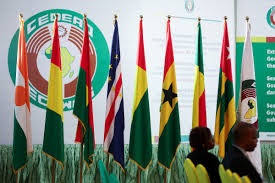The Economic Community of West African States (ECOWAS) Council of Ministers has convened an Extraordinary Session in Accra to discuss contingency plans following the formal withdrawal notice submitted by Burkina Faso, Mali, and Niger.
Chairing the session, Nigeria’s Minister of Foreign Affairs, Ambassador Yusuf Tuggar, expressed appreciation to the government and people of Ghana for hosting the high-level meeting. He also commended Ghana and the ECOWAS Commission for the successful commencement of activities marking the 50th anniversary of the regional bloc, describing it as a timely reflection on ECOWAS’s progress and goals.
“This gathering reflects our steadfast commitment to the growth and cohesion of our regional community, even in challenging times,” Tuggar said.
The meeting follows a directive from the ECOWAS Authority of Heads of State and Government during its 66th Ordinary Session, instructing the Council to adopt a framework and contingency plan for the exit of the three Sahel nations.
During the session, the ECOWAS Commission is expected to present detailed reports on the withdrawal process, including the suspension of programmes in the affected countries and implications for the free movement of people, goods, and services. The Council will also consider the relocation of ECOWAS institutions and agencies currently situated in Burkina Faso, Mali, and Niger, to minimize operational disruptions.
Ambassador Tuggar acknowledged the gravity of the moment, stating, “It was never our intention to face the withdrawal of member states. However, respecting their sovereignty under current military governments, we must now move forward with a strategic and coordinated response.”
He urged fellow ministers to treat the situation as a chance for institutional renewal and renewed commitment to regional integration, highlighting ECOWAS’s position as Africa’s most integrated regional bloc, with shared policies and a collective vision for political, economic, and security advancement.
“As we navigate this challenge, our duty is to preserve and strengthen the legacy of ECOWAS for future generations. We have overcome trials before—and we will again,” he stated.
Tuggar called for constructive engagement among member states and reaffirmed ECOWAS’s role as the foremost platform for addressing West Africa’s collective challenges.
“Membership, as the saying goes, has its privileges,” he concluded.
Edited by Nzubechukwu Eze.









